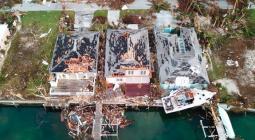Social Distancing And Storm Evacuations Save Lives. Here’s Why Some People Complain When They Do.

It is fascinating (and scary) to watch the COVID-19 coronavirus crisis play out. As a leader within the U.S. meteorological community, I notice several similarities between public responses to the virus and weather-risk communication challenges. People are struggling to grasp concepts like probability, exponential growth trends, and uncertainty and are hanging on day-to-day fluctuations in virus prediction models. Such models fluctuate daily because of sensitivity to changing initial conditions. The overvaluing of “the next weather model” run is common with high-impact events like hurricanes or snowstorms too.
However, the parallel that concerns me are responses to social distancing. A significant number of people remain defiant or skeptical even as data suggest case rates continue to grow exponentially. Most states have not peaked in case numbers or deaths, but there is evidence that social distancing measures are working in jurisdictions that took early and decisive actions. As “curve flattening” eventually happens, I predict that some people will say, “See the numbers were ______, it wasn’t that bad so why all the overreaction?”
This is common in my weather world too. It’s as if people are annoyed when they shelter or evacuate and return to find their house intact. What’s that all about?
Preventative or safety measures like social distancing, hurricane evacuations, or tornado sheltering are designed to reduce the number of fatalities. Oddly, there is often a tendency for people to question their purpose when they actually do what they were designed to do. Dr. Janet Frick is an Associate Professor of Psychology at the University of Georgia and offers perspective on this strange backlash effect. Professor Frick says the “challenge with determining that social distancing has been successful, of course, is that it will reduce the number of eventual illnesses and deaths.” She explains (below) something called “delay discounting” that seems quite relevant to this discussion.
Well-executed social distancing makes the threat seem like it wasn't that big a deal in the first place. This bears some similarity to the psychological principle of "delay discounting.” Delay discounting is a principle, seen in both psychology and economics, that people prefer a smaller immediate reward to a larger distant reward. With social distancing, we are asking people to sacrifice immediate comfort and even economic security for a later larger reward that we've never seen before — the potential collapse of our medical system in certain parts of the country. It's hard to feel "reinforced" by NOT experiencing something terrible — similarly to how if we evacuate in advance of a major storm and lives AREN'T lost, we think the initial response was an overreaction."
*Title photo: SYDNEY, AUSTRALIA - APRIL 05: A deserted Manly Beach following its closure today on April 05, 2020 in Sydney, Australia. Northern Beaches Council today closed Manly, North Steyne, Queenscliff, Freshwater and Palm Beach after crowds were seen gathering there defying social distancing regulations put in place by the government to combat the spread of COVID-19 in Australia. (Photo by Cameron Spencer/Getty Images)
5 April 2020
Forbes







